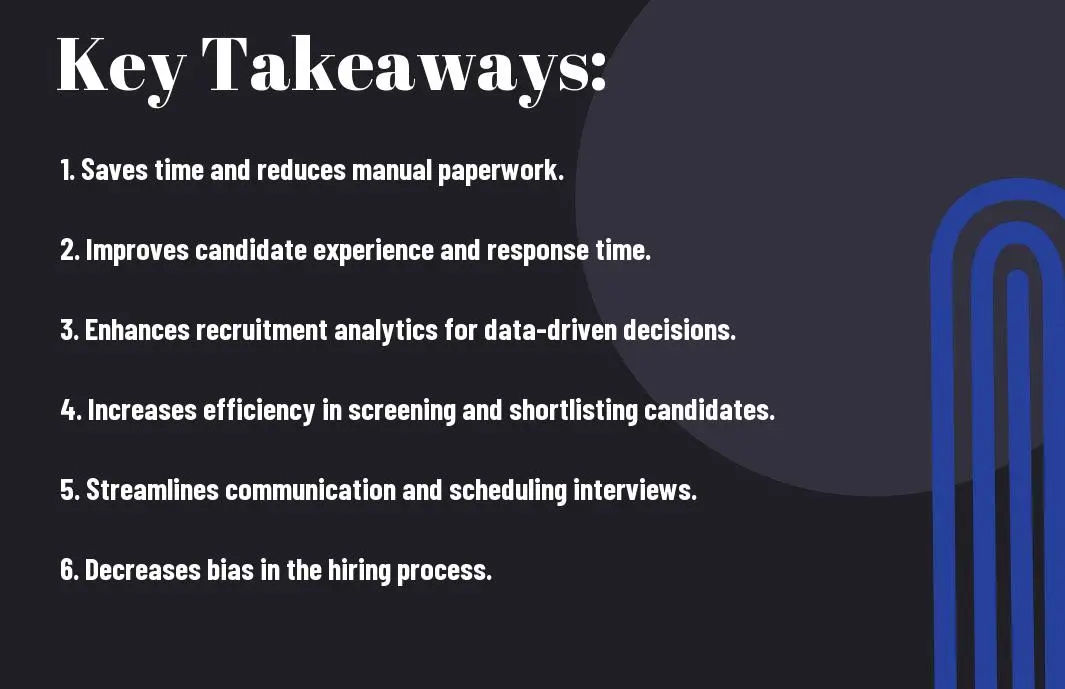Just imagine a world where recruitment and HR hiring processes are streamlined, efficient, and cost-effective due to automation. In this fast-paced business environment, organizations are realizing the benefits of incorporating technology to handle repetitive tasks, improve candidate experience, and make data-driven decisions. Let’s explore how automation can revolutionize the way companies attract, assess, and onboard top talents, ultimately leading to enhanced productivity and competitive advantage in the market.
Increased Efficiency
Reduced Time-to-Hire
A key advantage of automating recruitment and HR hiring processes is the reduction in time-to-hire. By utilizing software solutions for screening resumes, conducting initial assessments, and scheduling interviews, organizations can streamline the hiring process and identify qualified candidates more efficiently.
Automated systems can quickly filter through numerous applications, identifying top candidates based on predefined criteria set by the hiring managers. This not only saves time but also ensures that the recruitment team focuses their efforts on the most promising candidates, ultimately expediting the hiring process.
Automated Task Management
Increased efficiency is also achieved through automated task management. By automating routine tasks such as sending follow-up emails, scheduling interviews, and conducting background checks, HR professionals can focus their time and energy on strategic activities that require human intervention.
Management of these tasks through automated systems not only reduces the risk of errors but also ensures a consistent and timely execution of crucial recruitment activities. This ultimately leads to a more efficient hiring process and a better candidate experience.

Improved Accuracy
Minimized Human Error
Even the most experienced HR professionals can make mistakes when handling recruitment and hiring processes manually. Automating these processes can greatly reduce the risk of errors caused by human factors. Automated systems follow predefined rules and algorithms, ensuring that each step is carried out accurately and consistently.
Enhanced Data Analysis
Minimized human error leads to enhanced data analysis in recruitment and HR hiring processes. With automated systems, organizations can gather and analyze large volumes of data with precision and speed. Advanced analytics tools can identify patterns and trends in candidate profiles, helping recruiters make informed decisions.
Automated systems can also generate real-time reports and insights based on the collected data, enabling HR professionals to adapt their strategies quickly and effectively.
Enhanced Candidate Experience
Personalized Communication
With automated recruitment and HR hiring processes, companies can provide personalized communication to candidates throughout the hiring process. Automated systems can send tailored messages to candidates based on their application status, keeping them informed and engaged. This level of personalized communication can enhance the candidate experience and make them feel valued by the organization.
Faster Response Times
On top of personalized communication, automation enables faster response times during the recruitment process. Candidates no longer have to wait for manual processes to progress, as automated systems can swiftly move them through each stage. This not only speeds up the overall hiring process but also shows candidates that the company is efficient and respects their time.
Enhanced Candidate Experience is crucial in attracting and retaining top talent. By providing personalized communication and faster response times through automation, companies can improve their reputation among job seekers and create a positive candidate experience that sets them apart from competitors.
Cost Savings
Many companies are turning to automation in their recruitment and HR hiring processes to realize significant cost savings. There are two main areas where automation can lead to cost savings: Reduced Recruitment Agency Fees and Lower Administrative Costs.
Reduced Recruitment Agency Fees
For many organizations, one of the biggest expenses in the recruitment process is the fees paid to recruitment agencies. By automating the hiring process, companies can reduce their reliance on external agencies, ultimately saving money. By utilizing automated tools for sourcing, screening, and even initial interviews, companies can cut down on the need for external help.
Lower Administrative Costs
Savings in administrative costs are another significant advantage of automating recruitment and HR processes. Automating tasks such as scheduling interviews, sending out communication to candidates, and managing applicant data can free up HR personnel to focus on more strategic initiatives. This not only saves time but also reduces the likelihood of errors that can be costly to correct.
Another benefit of automating administrative tasks is the ability to streamline workflows and improve overall efficiency. With automation, repetitive tasks can be done quickly and accurately, reducing the time and resources required to manage the hiring process.
Better Data-Driven Decision Making
Despite the traditional methods of recruitment and HR hiring processes, automating these processes can lead to better data-driven decision-making. By leveraging technology and analytics, organizations can gain valuable insights that can enhance their overall recruitment strategies.
Access to Real-Time Analytics
With access to real-time analytics, organizations can make more informed decisions promptly. By tracking key recruitment metrics such as time-to-fill, cost-per-hire, and candidate quality, hiring managers can identify areas for improvement and adjust their strategies accordingly. This real-time data allows organizations to adapt quickly to changing market conditions and candidate preferences, giving them a competitive edge in attracting top talent.
Data-Backed Insights for Hiring Managers
Analytics can provide hiring managers with data-backed insights into their recruitment processes. By analyzing metrics such as candidate sources, hiring outcomes, and performance evaluations, managers can identify patterns and trends that lead to successful hires. These insights enable hiring managers to make more strategic decisions when it comes to sourcing, screening, and selecting candidates, ultimately improving the quality of hires and reducing turnover rates.
A data-driven approach empowers hiring managers to optimize their recruitment processes continuously, ensuring that they are not only attracting top talent but also retaining them in the long run.

Compliance and Risk Management
Automated Compliance Checks
The implementation of automated recruitment and HR hiring processes brings numerous advantages, among them being automated compliance checks. By utilizing technology to ensure compliance with various regulations and company policies, organizations can significantly reduce the likelihood of costly errors or oversights. Automated systems can swiftly scan through a vast amount of data to identify any discrepancies or non-compliance issues, thus ensuring that all hires meet the necessary requirements.
Reduced Risk of Discrimination
Management of compliance and risk also includes reducing the risk of discrimination in the hiring process. Automated systems can help by standardizing the evaluation criteria for all candidates, thereby minimizing any unconscious bias that may influence hiring decisions. With the use of AI and data analytics, organizations can identify and eliminate any patterns of discrimination, creating a more fair and inclusive recruitment process.
With automated compliance checks and a reduced risk of discrimination in place, organizations can ensure that they are adhering to the highest ethical standards while also protecting themselves from potential legal repercussions. By leveraging automation tools, companies can streamline their recruitment processes, minimize risks, and ultimately build a more diverse and talented workforce.
Conclusion
On the whole, automating recruitment and HR hiring processes can provide numerous advantages to organizations, such as saving time, reducing bias, improving efficiency, and enhancing candidate experiences. By utilizing technology to streamline these processes, companies can increase their productivity and focus on more strategic tasks that can contribute to their overall success.
Furthermore, automation can help organizations attract top talent, enhance their employer brand, and make more data-driven decisions when it comes to hiring. Overall, embracing automation in recruitment and HR hiring processes can lead to a more effective and successful workforce, ultimately benefiting the organization as a whole.
FAQ
Q: What are the advantages of automating Recruitment and HR hiring processes?
A: Automating Recruitment and HR hiring processes can streamline the entire hiring process, saving time and resources. It allows for quick screening of candidates, automated scheduling of interviews, and efficient communication with applicants.
Q: How does automating Recruitment and HR hiring processes improve candidate experience?
A: Automating these processes ensures that candidates receive timely updates on their application status and have a smooth and convenient application process. It improves transparency and communication, leading to a positive candidate experience.
Q: What are the long-term benefits of automating Recruitment and HR hiring processes for a company?
A: Automating Recruitment and HR hiring processes leads to increased efficiency, reduced hiring time, and improved quality of hires. It also allows HR teams to focus on strategic initiatives and talent development, ultimately benefiting the company’s long-term growth and success.




